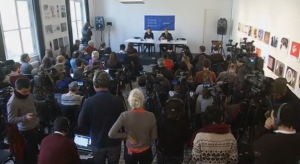
(Reuters) — Russia and China are imposing their biggest clampdown on civil society in a generation and Europe’s efforts to manage its migrant crisis risk undermining its core values, Human Rights Watch (HRW) says in its annual global review.
The review of more than 90 countries’ human rights records, released in Istanbul on Wednesday (January 27), highlighted Russia and China but said rights crackdowns are also taking place in countries from Ethiopia to Turkey.
“What we’ve noticed over the last year in particular is that the autocrats of the world, the authoritarian governments are running scared in the face of civil society,” the group’s Executive Director, Kenneth Roth, said at a news conference in Istanbul.
Roth cited moves that make life harder for civil society groups in Russia which receive foreign funding. Chinese activists struggle to establish rights groups and risk imprisonment under broad uses of anti-terror laws, he said.
Some of it was the result of the proliferation of social media.
“This has become particularly acute now that the civil society has been empowered by social media, particularly by social media on mobile phone. Because what that means is that it is much easier for civic groups to mobilise large numbers of people on the street in order to protest governmental policy,” Roth said.
“This fear of civil society has become particularly acute in Russia, in China. Because both Putin and Xi Jinping have made an implicit pact with their people. They say we will give you increasing prosperity; you let us govern without any real accountability. And that deal has worked for leaders while the economy improved. But now that the economy is in trouble those leaders are terrified that their people will begin to protest,” he added.
China rejects any criticism of its human rights record, saying it is a country ruled by law and that it opposes external interference in its domestic affairs.
Russian President Vladimir Putin has said he will not allow the West to use civil rights groups to foment unrest in Russia, suggesting their activities are sometimes politically-motivated and designed to undermine the tightly-controlled political system he has spent 15 years shaping.
HRW expressed concern that the influx of refugees to Europe from Syria and elsewhere has coincided with the rise of populist political parties exploiting Islamophobia.
“I think it is safe to say there has been a panic that has emerged in Europe because of the refugee flight. Because a million people got on boats in the course of 2015 and landed on Europe’s shores. Now, it is important to stress that the panic is not the product of numbers alone. One million people represents a mere 0.2 percent of European Union’s population of five hundred million,” Roth said.
“The issue isn’t the numbers alone. The issue in our view has been the chaos, the disorganised nature of the refugee flow. That chaos has given rise to a sense that Europe has lost control of its borders. That has given rise to fears of terrorism, that ISIS could slip operatives into the refugee flow and that has given rise to the sense that this migration flow might be endless,” he added.
Roth said one spillover from this was that Europe was not focusing on Turkey’s military crackdown on Kurdish militants and the prosecution of critical journalists, politicians and academics who accuse President Tayyip Erdogan of increasingly authoritarian tendencies.
Erdogan has vowed to continue operations until Turkey is “cleansed” of the Kurdistan Workers Party (PKK), which has waged an insurgency since 1984 and is deemed a terrorist organisation by Turkey, the United States and European Union.
Asked about Syrian peace talks, the next round due imminently in Geneva, Roth criticised the diplomatic process for not tackling atrocities on the ground.
“In our view, Secretary Kerry and his allies are going about the Geneva talks backwards. They seem to have the view that using Kerry’s diplomatic prowess that he can simply knock heads in Geneva and arrive at some kind of accord for Syria without addressing the atrocities taking place on the ground, that they will end the war first and the atrocities will come later. That is, I say, is going backwards,” he said.
The U.N.-backed talks bringing together representatives of the Syrian government and the opposition were originally scheduled to begin on Monday (January 25) but are now set for Friday (January 29) after wrangling over issues including who should attend.







